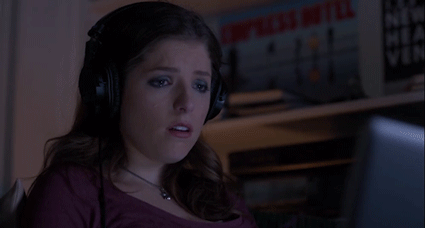“No! It’s supposed to be dm dm dm da, not dm da dm da! Come on, get it right!”
You’ll start hearing this conversation about a week out from the International Competition of Collegiate A Cappella (ICCA), the most important performance of every a cappella group’s life. If you’re out of touch and have never seen Pitch Perfect, you probably don’t know the hell that a group of singers will go through to reach their 12 minutes of fame—and even the movie gets some details wrong. Of course, people don’t usually projectile vomit everywhere, but the real inconsistency begins with their process.
Here’s a taste of the real ICCA experience.
1. Getting Sick of Your Songs

Singers love every single song choice when they first choose a set list months in advance. But after arranging, learning, memorizing, choreographing and performing the music for three straight months, you never want to listen to the songs again. “When you’ve been trying to arrange a song, weeks before anyone has even begun listening to it, you become so critical of every little piece of your arrangement that you end up hating the whole thing and want to scrap it,” University of Florida Music Director for the Sedoctaves Lucia Pradas-Bergnes said. “It’s only after you get reassurance from new ears that you occasionally start to re-like the song.” I’ve heard rumors of people throwing their shoes at the radio when one of their set choices comes on. Ain’t nobody got patience for that.
2. Sore Throat

Sore throats plague the ICCA process. No member of the group is immune. Another mistake from Pitch Perfect? The Bellas’ performance lasts about five minutes. Real performance lasts about 10-12 minutes, which can strain even the strongest of vocal chords. “I was sick while performing and, even though it sucks, I had to push through it,” UF Sedoctaves Business Manager Brenna Storm said. “I learned that even when you’re sick and think you sound bad, the audience usually doesn’t even know.” Smart a cappella groups keep extra honey and tea available at every rehearsal for the singers who repeatedly lose their voices. Hopefully you don’t get nodes!
3. Physical Exhaustion

Unfortunately, horizontal running never makes it into the choreography. Expect lots of sweating by the end of each rehearsal. And the few times the director lets you stop moving, make sure your heavy breathing can’t be picked up by a mic. “While working on the set is a lot of fun, by the time I finally get home I feel exhausted and could sleep for hours,” UF Sedocataves soprano Kassandra Crompton said. Fat Amy said it best, “I should have taken that cardio tip more seriously.”
4. Mental Exhaustion

After weeks of non-stop choreo, your body reaches a new level of numb. Your director might give you a break from the sweat and focus an entire rehearsal on dynamics, but now you struggle to remember all the sounds you’re supposed to make along with your newly-added movements. “Because it’s such a long process, if you don’t take care of yourself, you’re going to end up more than just exhausted,” UF Sedoctaves social director Nicole Fernandez-Valle said. Your brain starts to hurt from trying to memorize so many different little details. Pretty soon the state of your mind matches the exhaustion your body feels.
5. Tears

There’s bound to be a kick-ass pop song, but every set has its ballad—that tear-filled slow song that pulls at our heartstrings and makes the audience cry. “Musicians connect to music on a deeper level than people who just listen to it. We put a piece of ourselves into our music and share what the songs mean to us,” UF Sedoctaves performance director Rachel Hutcherson said. “We end up blending these different stories and emotions into a melting pot that creates an incredible song anyone can relate to.” You better believe that the over 1,000 member audience and you will cry. I hope you’re not an ugly crier.
6. Extra Rehearsals

As ICCA approaches, the cramming begins. Groups add extra rehearsals, including 12-hour-long performance over the weekends. “It’s draining but also a great opportunity for us to grow and get ready to perform,” UF Sedoctaves bass Brooke Azzaro said. These extra hours give you time to add unique twists to the set, but man are they tiring. “My work load this semester is pretty heavy, so I have to be really good at getting things done before our rehearsals so I can find time to sleep,” UF Sedoctaves soprano Mary Kenney said. Nobody gets this far only to give 50 percent effort. A cappella brothers and sisters dedicate every waking moment to making this the performance of a lifetime.
7. No Sleep and Stress

When ICCA rehearsals end each night, you want nothing more than to go home and fall into bed and sleep. Then you remember the two essays, math assignment and video presentation you have to get through. “We get out of rehearsal at 10 p.m. and I still have to do homework and my job. I’m starting to get behind in school, but I know that the lack of sleep and the all day rehearsals are going to be worth it,” UF Sedoctaves alto Rory Medley said. Participating in ICCA means so much more than singing before a crowd—it means working through the nights leading up to the event to complete your homework only to start the process again after about an hour of sleep.
8. Getting to Know Each Other Wayyy Too Well

A cappella members spend every day with the crew and know every secret that members haven’t even told their siblings or significant others; they know little things like how long it takes for each person to put on makeup or what foods force the vocal percussionist into the bathroom. Aca-awkward. “While all the stories that you tell to your other friends involve The Sedoctaves, and it can get pretty repetitive, you start to realize that you can do anything in front of your aca-fam and there is no judgment,” UF Sedoctaves soprano Katt Weller said. At this point, nothing anyone says can surprise.
9. The Final Day

The lack of sleep mixed with the stress of ICCA and classes make you break out hours before the competition. You grab heavy foundation and concealer in hopes that you can cover all the blemishes. You want to look like a perfected version of yourself under the stage lights, not the aftermath of an oil spill. When you finally finish working on your outer shell, you look around and see the faces of your best friends surrounding you. You can’t know how the performance will go until it happens, but that’s part of the experience. “The second you step on stage, everything resorts to muscle memory,” UF Sedoctaves President Megan Nardo said. “As much as I wish I could live in the moment and remember performing with my friends, I don’t think I’ll ever remember a single performance. Total blackout.” It’s show time.
10. The Feeling of Pride and Success

“There’s a moment between when you finish the show and when final deliberations happen,” UF Sedoctaves bass Cory Kennedy said. “In that moment, regardless of the awards coming up or what’s come before, you can look around at your aca-fam—who swear that they just blacked out for 10-12 min—and know that what we had just done was the best thing we’ve ever done, and we’ve done it together.” Performing at the ICCA gives you the greatest sense of achievement and pride, regardless of the outcome. Only eight more months until you start again!



















